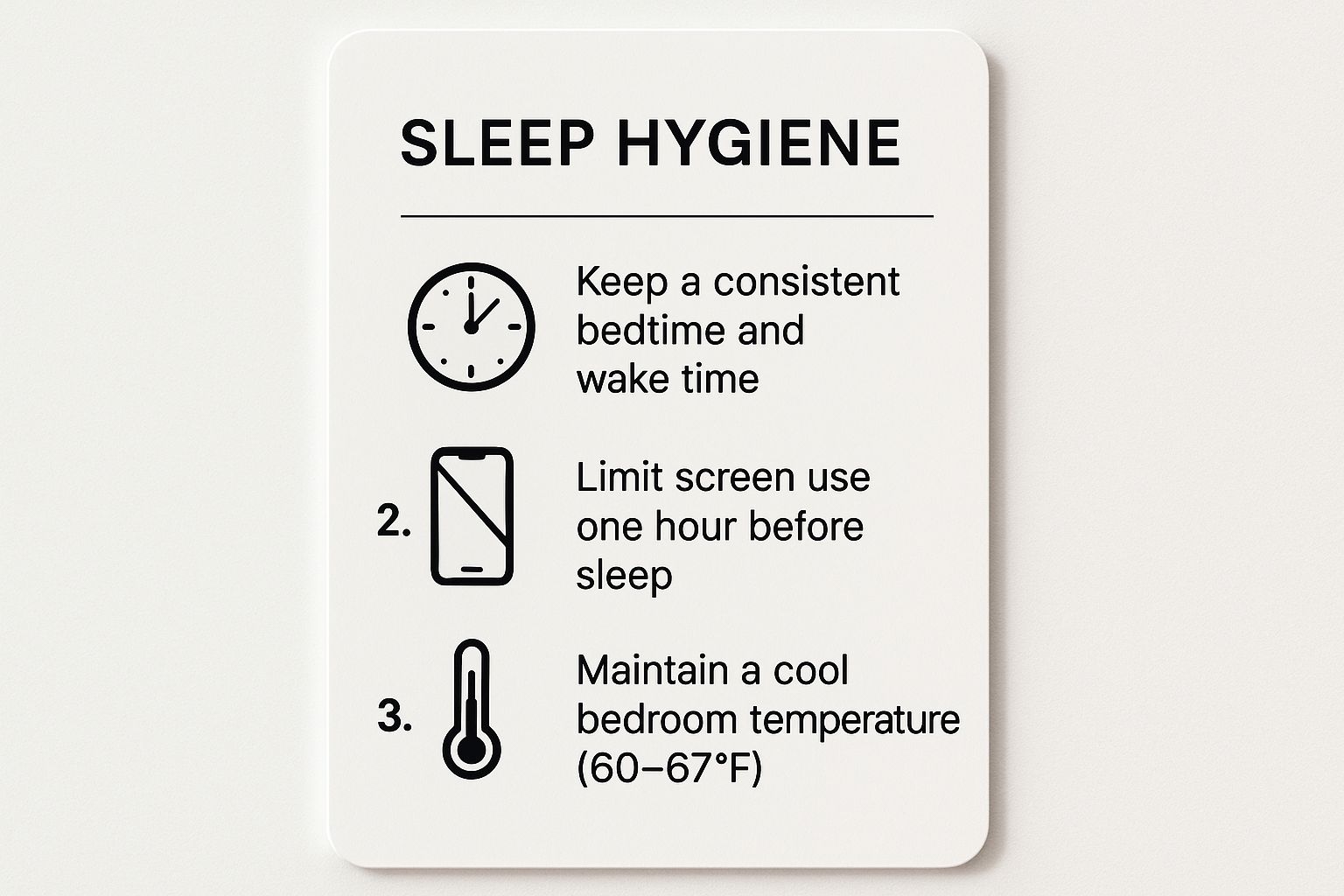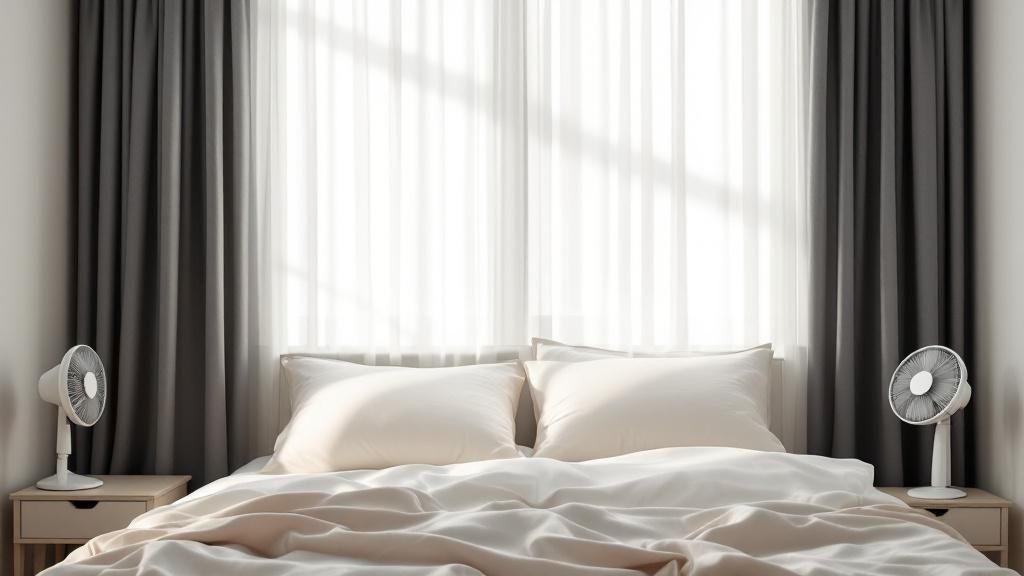If you find yourself wide awake at 3 AM, know that you’re in good company. The struggle to get a decent night's sleep during menopause isn't just in your head—it's a real, biological challenge. Your hormones are throwing a party, and your body's internal clock didn't get the memo. Figuring out why this is happening is the first real step toward getting your rest back.
Why Menopause Can Wreck Your Sleep
The transition into menopause can feel like your body has turned against you, especially when the sun goes down. What used to be as simple as your head hitting the pillow can suddenly become a nightly struggle. This isn't a personal failure; it's the direct result of hormonal changes creating a perfect storm for sleepless nights.
The main offenders are your declining levels of estrogen and progesterone. These two hormones do a lot more than just manage your reproductive cycle; they're also deeply involved in how well you sleep.
- Estrogen is a key player in regulating your body temperature. It also works with the brain chemicals that help you stay asleep. As estrogen levels drop, your internal thermostat can go completely haywire.
- Progesterone is often called the "calming" hormone for a good reason. It has a natural, sleep-promoting effect. When it declines, you might feel more on edge or anxious, especially at bedtime.
The Main Reasons You're Tossing and Turning
This hormonal rollercoaster kicks off a few well-known symptoms that are notorious for ruining a good night's sleep. The most infamous is the night sweat—the nighttime version of a hot flash. Waking up drenched in sweat is jarring, often forcing you to change your clothes or even the sheets. It's nearly impossible to get deep, restorative sleep when your body is constantly fighting these intense waves of heat.
Then there’s the anxiety. The menopausal years often overlap with other major life stressors, and a racing mind can be one of the biggest roadblocks to sleep. You might find yourself stuck in a loop, replaying conversations or worrying about tomorrow's to-do list right when you should be winding down.
It's not just a feeling; the numbers back it up. A major meta-analysis showed that more than half (51.6%) of postmenopausal women suffer from a sleep disorder. Conditions like restless legs syndrome are particularly common, affecting a staggering 63.8% of this group.
These statistics just confirm what millions of women already know from firsthand experience: poor sleep is a hallmark of this stage of life. You can read more about these extensive findings on postmenopausal sleep disorders to see just how common it is. Once you understand what's causing the problem, you can start fighting back with strategies that actually work.
Turning Your Bedroom Into a Menopause-Friendly Sleep Sanctuary
Your bedroom should be a refuge from the day, but when you're going through menopause, it can start to feel like a battleground. Those hormonal shifts can make you incredibly sensitive to your environment. I've found that one of the most powerful things you can do is intentionally create a space that directly counters symptoms like night sweats and restlessness.
This isn't just about tidying up. It's about a complete mindset shift—turning your room into a true sanctuary for sleep. The guiding principles are simple but incredibly effective: keep your room cool, dark, and quiet.
Keep Things Cool and Breathable
Night sweats are, for many of us, the number one sleep thief during menopause. The trick is to get ahead of the heat before it wakes you up.
Start with your bedding. Those heavy, synthetic fabrics are a nightmare; they trap heat and moisture, making night sweats feel ten times worse. Instead, look for materials known for their breathability.
- 100% Organic Bamboo: This is my personal favorite. It’s unbelievably soft and silky, but its real magic is how well it pulls moisture away from your skin and lets heat escape.
- Lightweight Cotton: A classic for a reason. Look for high-quality, long-staple cotton like percale, which has that crisp, cool-to-the-touch feeling that’s so refreshing.
- Cooling Tech: Don't overlook cooling mattress toppers or pillows. Many are now engineered with special gels or materials that actively absorb and pull body heat away from you.
A cool room isn't just a suggestion; it's essential. Experts agree that the ideal temperature for sleep is somewhere between 60-67°F (15-19°C). Dropping the thermostat helps lower your core body temperature, which is a powerful, natural signal to your body that it's time for rest.
This infographic lays out some foundational habits for better sleep, and you'll notice a cool room is a cornerstone.

When you pair a cool room with a consistent sleep schedule and less screen time before bed, you're building a powerful routine that paves the way for deeper, more restorative rest.
To make things easier, here's a quick checklist you can use to audit your own bedroom.
Your Menopause-Friendly Bedroom Checklist
| Element | Recommendation for Menopause | Why It Helps |
|---|---|---|
| Temperature | Set thermostat to 60-67°F (15-19°C) | Helps lower core body temperature to initiate sleep and reduces the intensity of night sweats. |
| Bedding | Organic bamboo or lightweight cotton sheets | These fabrics are breathable and wick moisture, keeping you dry and cool. |
| Pillows & Mattress | Consider cooling gel pillows or a mattress topper | Actively draws heat away from your body, preventing overheating. |
| Lighting | Blackout curtains or shades | Blocks external light that can disrupt melatonin production and wake you up prematurely. |
| Sound | White noise machine or earplugs | Masks disruptive sounds like traffic or snoring, creating a consistent auditory environment. |
Making these adjustments can transform your sleep experience, turning your bedroom back into the peaceful escape it's meant to be.
Create Total Darkness and Quiet
Finally, let's talk about light and noise. Both are direct signals to your brain to stay awake, the last thing you need when you're desperate for sleep.
Blackout curtains are a fantastic investment to block out streetlights and the way-too-early morning sun. And if you have skylights, exploring effective skylight shade solutions can be a total game-changer for getting that last hour of sleep.
If outside noise from traffic or neighbors is the problem, a white noise machine is brilliant for masking those jarring sounds. Don't feel like you're alone in this struggle, either. Research shows that sleep disturbances affect a staggering 40% to 69% of women during the menopausal transition. You are not imagining it, and you're certainly not the only one.
Adjust Your Daily Habits for Better Nights

It’s a common misconception that getting a good night’s rest starts when you climb into bed. The truth is, how you spend your day directly sets the stage for how you'll sleep at night. Building a solid foundation for sleep involves small, deliberate tweaks to your daily routine, long before your head ever hits the pillow.
Think of your body's internal clock—your circadian rhythm—as a sensitive instrument. During menopause, the hormonal fluctuations can throw this rhythm completely out of tune. The single most powerful way to get it back on track is with absolute consistency. I know it's tough, but that means going to bed and waking up at the same time every single day. Yes, even on weekends. This simple discipline can work wonders.
Be Mindful of What You Consume
What you eat and drink, especially in the hours leading up to bedtime, can be a major culprit behind a restless night. That glass of wine might feel relaxing at first, but alcohol often fragments sleep and can make hot flashes worse later on.
The same goes for food. A spicy meal or a heavy dinner too close to bedtime can raise your body temperature and lead to indigestion, both of which make it much harder to fall asleep. As a rule of thumb, try to finish your last large meal at least three hours before you plan to turn in.
Time Your Exercise Wisely
Regular exercise is one of the best things you can do for your sleep, but the timing is crucial. Gentle, restorative activities like a brisk walk, a swim, or yoga are fantastic for reducing stress and signaling to your body that it’s time to wind down.
On the other hand, a high-intensity workout right before bed can have the opposite effect. It elevates your core body temperature and heart rate, essentially telling your body it’s time for action, not rest. If you prefer more vigorous exercise, aim to wrap it up at least 3-4 hours before you go to sleep.
These kinds of adjustments are central to improving not just your rest but your overall wellness, a connection we dive into in our article about the https://bamtekhome.com/blogs/sleep-and-your-health.
For some, lifestyle changes alone are enough. For others, a little extra support can make all the difference. You might want to explore the best supplements for better sleep to see if they can provide the targeted help you need for a more restorative night.
Calm a Racing Mind at Bedtime

For so many women going through menopause, the physical symptoms are just one part of the story. The other, often more frustrating part, is trying to quiet a mind that decides to run a marathon the second your head hits the pillow. Figuring out how to handle this pre-sleep anxiety is a game-changer for getting your rest back.
One of the biggest culprits stealing our sleep, especially when hormones ramp up anxiety, is a brain that simply won't switch off. Learning how to stop overthinking at night is a real skill, and it's one you can absolutely develop to reclaim your nights.
Practical Techniques to Find Calm
I've found one of the most practical strategies is what I call a "brain dump." About an hour before bed, take out a notebook and just let it all out—the worries, the to-do list for tomorrow, that random thought about a conversation you had last week. The simple act of putting pen to paper can feel like you're physically moving those thoughts out of your head.
Another fantastic tool, one you can do right there in bed, is a guided body scan. Just lie down, get comfortable, and focus your attention on your toes. Notice any tightness or tension, but don't judge it. Slowly, deliberately, move your focus up your body, consciously relaxing each muscle group along the way. It’s a powerful way to ground yourself in your body and pull your focus away from those endless, looping thoughts.
My Favorite Tip: Your breath is your most powerful, built-in tool for finding calm. When your mind is racing, pay attention to your breathing—it's probably fast and shallow. By intentionally slowing it down, you send a direct message to your nervous system that it’s time to relax.
Here’s a simple breathing exercise I swear by—the 4-7-8 method:
- Breathe in quietly through your nose for a count of 4.
- Hold that breath gently for a count of 7.
- Exhale completely through your mouth with a soft "whoosh" sound for a count of 8.
Doing this cycle just three or four times can make a world of difference. When you pair these mental calming techniques with a comfortable sleep environment, you're setting yourself up for success. Making sure physical discomfort isn't adding to your stress is key, which is why things like cooling sheets for night sweats can be so helpful.
Know When to Talk to Your Doctor About Sleep

While adjusting your lifestyle and creating a sleep sanctuary are fantastic first steps, sometimes they just don't cut it. The hormonal upheaval of menopause can be intense, and there are times when self-care strategies alone aren't enough to bring relief. Recognizing when you need to bring in a professional is a critical part of managing your health during this transition.
If your sleep issues have become severe, dragging on for weeks and making it difficult to function during the day, it's time to book an appointment. You absolutely do not have to just "power through" chronic exhaustion. This is particularly important if you or your partner notice any red flags that could signal a more serious underlying condition.
For instance, does your partner complain about your loud snoring? Have they mentioned that you sometimes gasp for air or even seem to stop breathing for a moment while you're asleep? These are classic signs of sleep apnea, a condition that becomes more prevalent after menopause and needs a proper medical diagnosis. Another common culprit is an overwhelming, creepy-crawly urge to move your legs at night, which could point to Restless Legs Syndrome (RLS).
Starting the Conversation with Your Doctor
Walking into your doctor's office prepared can make a world of difference. When you can clearly articulate your symptoms and have an idea of potential treatments, you can have a much more productive conversation and advocate for yourself effectively.
Your experience is valid, and these symptoms are treatable. Seeking medical advice isn't a failure—it's a proactive, powerful step toward reclaiming your well-being.
Your doctor will likely discuss a few different paths forward. Be ready to ask questions about them.
- Menopause Hormone Therapy (MHT): For many women, MHT is highly effective at getting night sweats and other disruptive symptoms under control.
- Non-Hormonal Medications: If MHT isn't right for you, certain low-dose antidepressants or other medications can significantly reduce hot flashes and improve sleep quality.
- Cognitive Behavioral Therapy for Insomnia (CBT-I): This is a proven, non-drug therapy that helps you reframe your thoughts and habits around sleep for long-term results.
Together, you and your healthcare provider can weigh the pros and cons to find a solution that aligns with your health history and personal comfort level. And remember, creating a comfortable physical environment is still essential. Finding the best bedding for menopause can work hand-in-hand with any medical treatment you decide to pursue.
Navigating Menopause and Sleep: Your Questions Answered
https://www.youtube.com/embed/p5Qcxb7FVo0
I get it. Trying to figure out sleep during menopause can feel like navigating a maze in the dark. You're probably wondering what's "normal," what might actually bring some relief, and frankly, how long this will last. Let's break down some of the most common questions I hear from women going through this.
Can Supplements Like Magnesium or Melatonin Really Help?
This is a big one. Many women I've worked with have found some real success with supplements, but it’s crucial to know what you’re taking and why. There’s no magic pill, and what works wonders for your friend might do nothing for you.
- Magnesium Glycinate: If I had to pick one, this is often the go-to. This specific form of magnesium is known for helping calm the nervous system and relax muscles. For many, that’s just enough to help them drift off and stay asleep without that restless, antsy feeling.
- Melatonin: Your body makes this hormone naturally to regulate your sleep-wake cycle. While it can be helpful for a short-term reset (think jet lag or getting back on track after a few rough nights), I don't typically recommend it as a long-term nightly solution. It can become a crutch.
Before you start anything new, please talk to your doctor. This is non-negotiable. They can help you figure out the right dose and make sure it won’t interfere with other medications or health conditions.
How Long Until These Lifestyle Changes Actually Work?
This is where patience becomes your superpower. Some adjustments give you a win right away—turning down the thermostat or investing in cooling bedding can stop you from overheating that very night.
But the bigger, more fundamental changes need time to take root. You might start noticing a shift from dietary tweaks or a new exercise habit within a couple of weeks. When it comes to truly resetting your body’s internal clock with a consistent sleep schedule, give it a solid month. Focus on being consistent, not perfect.
Is It Normal for Sleep Problems to Come and Go?
Yes, absolutely. In fact, this is one of the most maddening aspects of the whole perimenopause transition. Your hormones aren't declining in a nice, neat line; they're all over the place.
This means you might have a few great weeks of sleep and think you've cracked the code, only to be hit with a wave of night sweats and insomnia out of nowhere. This hormonal chaos is a hallmark of this life stage. The best defense is a good offense: build a "toolkit" of strategies you can turn to, so when a bad night or week strikes, you're ready to manage it.
Creating the right sleep sanctuary can make all the difference. Bamtek Home offers premium bedding crafted from 100% organic bamboo, specifically designed to keep you cool and comfortable all night. Feel the difference that breathable, hypoallergenic sheets can make by exploring the collection on their official website.










